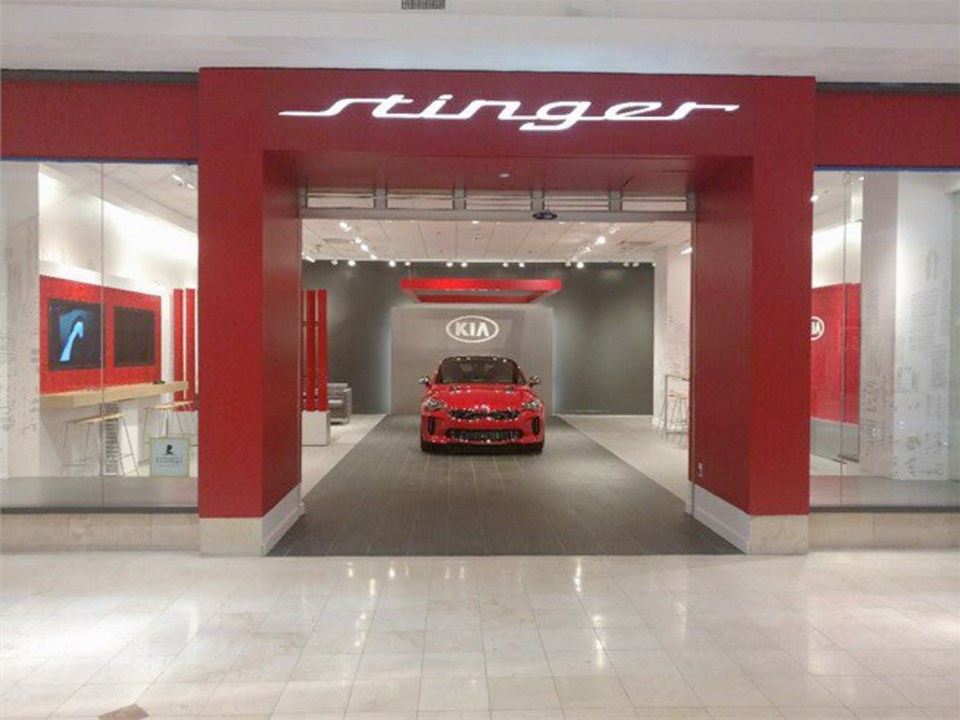AVENTURA, Florida — Sitting in a line of cars on the terminally traffic-choked Biscayne Boulevard, it’s hard to believe that Aventura was originally 785 acres of submerged, undeveloped swamp along the Intracoastal Waterway in Miami-Dade County. These days, the town is a mecca for shopaholics thanks to the Aventura Mall and its concentration of the world’s finest retailers and automakers.
Yes, automakers.
It’s here that you’ll find the Mercedes-Benz Retail Experience, a temporary pop-up store that displays select Mercedes-Benz vehicles and a large selection of branded lifestyle items. It’s only the second such boutique in the United States. The boutique allows Mercedes-Benz to reach consumers where they typically shop.
“The first one we had was in Lenox Square in Atlanta in 2017, and it did phenomenally. So we decided to take this further in 2018,” said company spokesperson Lindsay Munson.
“We wanted the first one to be in Atlanta, given our headquarters had moved there. Then it’s based on popular shopping destinations and time of year. We are here in Miami in the summer because it’s hot here and a lot of people don’t spend a lot of time outside and they do go into shopping malls.”
Once this pop-up store closes, Munson said, the next one to open will be in Chicago at 401 N. Michigan Ave. It will remain open through Sept. 30, with more stores opening nationwide in 2019, although the company is still finalizing its plans.
Here, you can sit in vehicles and get in-depth information from corporate-trained product specialists, although you can’t buy a car at the store. Instead, specialists will refer you to your nearest retailer and give you special incentives for visiting.
In the case of the Aventura store, Mercedes-Benz is displayed the GLA and GLC crossovers and the AMG GT R sports coupe.
But even if you can’t afford the cars, you can afford the merchandise, which includes jewelry, shirts, mugs, hats, key chains, leather iPhone cases, watches and more. “You can deck yourself out in a whole outfit and accessories that match your vehicle if you really want to,” Munson said.
The boutique has even hosted special events.
The boutiques stoke sales in markets where the boutiques operate, although Mercedes-Benz would not share financial results as the concept is still in the pilot stage. The automaker isn’t committing to making it permanent, although “we are not ruling anything out for the future,” according to Munson.
Automakers are turning to mall-based showcases to reach consumers in a way that auto shows can’t.
“Keep in mind the cost of an auto show is millions of dollars, and they have to share the stage,” said Rebecca Lindland, executive analyst for Cox Automotive. “At auto shows, one manufacturer told me they spend between $6 million and $7 million US. And they’re not even one of the big ones.”
And what do automakers get for that money? They get to share the spotlight with their competitors in the same hall. And there’s no guarantee a consumer will even walk into their stand.
“It’s crazy,” Lindland said. “This is why auto shows are struggling.”
By contrast, Lindland says Mercedes-Benz can measure a pop-up store’s return on investment by measuring how many people visited, how many leads were generated, and tie it directly to how many cars were sold. “Let’s say the store is $2 million to invest, build and put up, and you walk away with 100-200 solid leads from people who say: ‘I want to buy a car.’ You can absorb that $2 million awfully quickly. It’s a much better impact for their dollar and I would argue in most cases even less money.”
One reason is a corporate store’s pleasant, immersive, low-key environment. It’s a relaxed way to learn whether a vehicle is right for you because the specialists can’t sell you a car. With the exception of Tesla, automakers such as Mercedes-Benz can’t directly sell you a car. That’s the role of their franchised dealers, and it’s the law in all 50 states.
Laws notwithstanding, few people enjoy buying a car.
Cox Automotive did a survey, and exactly one per cent of survey takers were happy with the car buying process. One per cent. So there is more than room for improvement.
These are the issues driving Mercedes-Benz to its retail experiment, although they’re not alone.
In December, Kia Motors opened “Stinger Salons” in malls across the U.S. to showcase its new Stinger GT sports sedan. Locations include the Irvine Spectrum in Irvine, California; the Valley Fair Mall in Santa Clara, California; the Mall of Georgia in Buford, Georgia; the Old Orchard Mall in Skokie, Illinois; the Montgomery Mall in Bethesda, Maryland; the Westchester Mall in White Plains, New York; and the Domain in Austin, Texas, with one coming soon to the Aventura Mall. They will remain open through the holiday season, according to company spokesperson James Bell.
As in the Mercedes-Benz stores, consumers can learn about vehicles from product specialist, who can then refer them to their nearest Kia dealer.
But even if you can’t afford a Mercedes-Benz GLC or Kia Stinger GT today, but can spring for a shirt, hat or watch, automakers are hoping the stores stoke future sales.
“It’s building brand goodwill, it’s building an experience that consumers are so desperate for,” Lindland said.
“This is really an entire brand experience,” Munson added. “There’s a lot more to do in this space than just see the vehicles."



